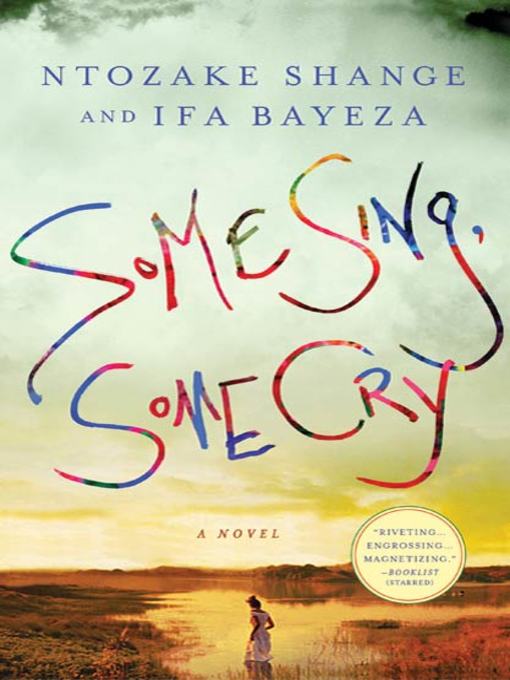
Some Sing, Some Cry
A Novel
کتاب های مرتبط
- اطلاعات
- نقد و بررسی
- دیدگاه کاربران
نقد و بررسی

July 26, 2010
Sisters and playwrights Ntozake Shange (for colored girls who have considered suicide) and Ifa Bayeza (the play The Ballad of Emmett Till) have composed a sweeping African-American saga animating 200 years of history through the voices of seven generations of the Mayfield family's women, beginning with Elizabeth (Ma Bete), a freed slave, and her granddaughter Eudora. Their fate and that of their progeny follows historical events from the Jim Crow South to the civil rights movement with tragedy and triumph: Eudora is gang raped, giving birth to light-skinned Elma, who grows up and moves to New York followed by her half-sister, Lizzie, a single mother with her own tragic past. Lizzie redefines herself during the Harlem Renaissance, abandoning her daughter, Cinnamon, to become a cabaret legend in Paris. Cinnamon carries the story through the 1940s and the 1960s Chicago busing, but here the novel unravels in a rush to wrap things up with too many characters and no time to develop them. This is a complex poetic treatise on race, culture, love, and family, the use of regional vernacular, dialect, and pure song, resulting in a provocative fictional history.

August 15, 2010
Lyrical multigenerational novel by playwright/author Shange (We Troubled the Waters, 2009, etc.) and her playwright/set designer sister Bayeza.
If music be the food of love, it is the staff of life for "the colored Mayfields" and their descendants over the next century and a half. As the story opens, two of those Mayfields, Bette and her granddaughter Eudora, are departing their home, a South Carolina plantation called Sweet Tamarind, displaced by post–Civil War carpetbaggers who "had bought all the land and paid the white Mayfields a smidgeon of what it was worth and left the poor blacks high and dry." It will not be the first indignity the black Mayfields are made to suffer, but they are a resourceful lot—and uncommonly blessed with the gift of song, masters of countless instruments and genres. That gift binds banjo-strumming Bette to seventh-generation descendant Tokyo Walker, a world-traveling singer of our own time who is not spared the task of battling injustices all her own: "Back taxes and a reputation for bad behavior had trailed her all the way to Botswana," write the authors, but redemption of a sort finds her there as well. Shange and Bayeza account song as an instrument of resistance; for the generation of the age of ragtime, it heralds "the New Negro"; for another, it affords a means of escape to less racially fraught places ("America? You can have it," says the expatriate Mitch after having found France a far more welcoming homeland than his native country); for all, it provides a potent means of self-expression. The authors range across centuries and continents, and to all appearances they've enjoyed the work of creating a world and peopling it with "lords, ladies, starlets, gigolos, gangsters, and aldermen—band leaders, bootleggers, and bag men—prophets, pigfoot hawkers, and professional partiers"—to say nothing of the blues shouters and balladeers of the Mayfield line.
Think of it as Roots with a treble clef—a confident, lively account of love, art and what falls between.(COPYRIGHT (2010) KIRKUS REVIEWS/NIELSEN BUSINESS MEDIA, INC. ALL RIGHTS RESERVED.)

July 1, 2010
Sisters Shange ("for colored girls who have considered suicide/when the rainbow is enuf" and Bayeza ("The Ballad of Emmet Till" have joined forces to tell a fictional version of their family history through the lives of seven generations of powerful women. This sweeping saga begins before the Civil War on the Mayfield rice plantation off the coast of South Carolina, where the family matriarch, Ma Bette, bears her master's children and after the war makes her way to Charleston with her granddaughter Eudora. What gives the Mayfield women their strength is their musical talent, from gospel to minstrel shows, from opera and R&B to hip-hop. The novel, replete with the rhythms of African American music and the speech patterns of Gullah culture, sings as it offers a dense description of the often violent history of the struggles of African Americans, particularly from the women's point of view. VERDICTThis family epic is likely to appeal to readers who love "Roots"and big generational novels that reconstruct African American history. With its depiction of strong, talented women, the novel may also be enjoyed by feminist readers.—Andrea Kempf, Johnson Cty. Community Coll. Lib., Overland Park, KS
Copyright 2010 Library Journal, LLC Used with permission.

Starred review from June 1, 2010
Revered poet, playwright, and novelist Shange teams up with her award-winning playwright sister Bayeza in this encompassing historical saga of African American life. In its riveting dramatization of the promise of emancipation, the brutality of Reconstruction, the baroque cruelty of the Jim Crow era, all the way to the possibilities of the digital age, this bittersweet tale of seven generations in a family of mixed blood and musical genius weaves together essential historical facts and profound emotional truths. The postbellum exodus of Betty, a woman of spiritual powers, from a decimated South Carolina plantationwhere she endured a tragic entanglement with the owner and gave life to children of unusual beauty, talent, and determinationlaunches this engrossing novel. Each character is magnetizingfrom Betty to her ambitious daughter Eudora to her renegade daughter Lizzie to brave Osceola to Cinnamon, Tokyo, and Liberty. Each setting, from Charleston to Harlem, is brilliantly realized, and each social convulsion, most strikingly the violence against black veterans of WWI, is intimately illuminated, while anguished conflicts erupt between men and women in shattering microcosms of larger societal crimes. With music as a sustaining force, Shange and Bayezas epic of courage, improvisation, and transcendence is glorious in its scope, lyricism, and spectrum of yearnings, convictions, and triumphs.(Reprinted with permission of Booklist, copyright 2010, American Library Association.)

























دیدگاه کاربران